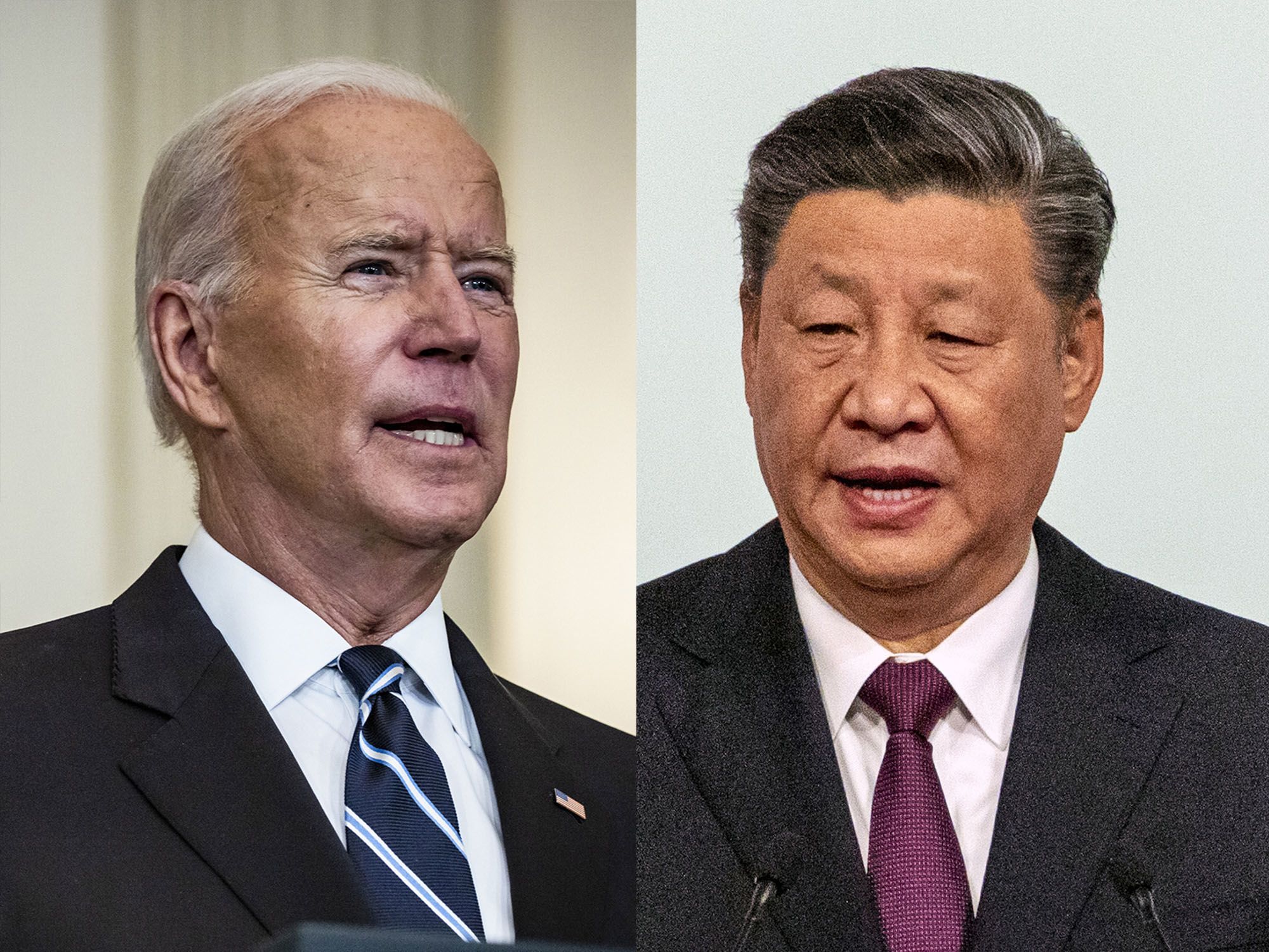
President Joe Biden will speak with Chinese leader Xi Jinping on Thursday amid fresh tensions over Taiwan, according to people familiar with the matter.
The first conversation between the two presidents since March will take place at a particularly difficult juncture for US-China ties: House Speaker Nancy Pelosi’s staff and security officials aren’t ruling out plans for her to visit Taiwan in early August.
Chinese Foreign Ministry spokesman Zhao Lijian said Monday that Beijing was getting “seriously prepared” for the possibility that Pelosi could visit the the self-governing island, which China considers part of its territory.
US Ambassador to China Nicholas Burns said in June that relations with China have deteriorated to probably “the lowest moment” since diplomatic relations resumed in 1972. Biden, who is recovering from the coronavirus at the White House, also is considering whether to lift some tariffs on Chinese imports in a bid to stem rampant inflation.
US officials have stressed that the Xi call would be a continuation of the administration’s efforts to maintain open lines of communication to ensure that the relationship doesn’t veer into unintended conflict.
No final decision has been made about a stop in Taiwan during Pelosi’s trip to Asia next month, according to a person familiar with the details. Pelosi would be the first sitting speaker since Newt Gingrich to visit the island.
Beijing immediately vowed to take “resolute and strong” measures in response and warned of a “grave impact” on bilateral relations should Pelosi go ahead with the trip. China also privately warned the Biden administration of a possible military response, the Financial Times reported.
“All the ensuing consequences shall be borne by the US side,” Zhao said.
Wang Yang, a member of the Politburo Standing Committee, said at a meeting on Tuesday that “no individual and no force should underestimate the resolve, the will and the ability of the Chinese people to defend their national sovereignty and territorial integrity.”
He also “stressed the importance of upholding the one-China principle,” according to the official Xinhua News Agency.
In the US, lawmakers in both parties encouraged Pelosi to make the trip, saying not doing so following China’s protestations would amount to acquiescing to Beijing.
“If we can allow the Chinese to dictate who can visit Taiwan and who cannot, then we have already ceded Taiwan to the Chinese,” said Senate Foreign Relations Chair Bob Menendez, a New Jersey Democrat, who made his own trip to Taiwan in April.
House Minority Leader Kevin McCarthy said Tuesday evening that Pelosi “shouldn’t back down now,” but that she “should make it a bipartisan trip.”
Biden told reporters last week that the US military didn’t think Pelosi’s trip was a good idea, prompting consternation in Taiwan. It’s not clear if Pelosi, at the request of intelligence and defense officials, will decide against the trip.
The president provoked China in May with a vow to defend Taiwan militarily. After saying that US policy on Taiwan “had not changed at all” during a news conference in Tokyo, he then answered “yes” when asked if the US would act “militarily” to defend the island in the event of a Chinese attack.
White House officials later walked back the remark, saying the president was only promising US aid to help Taiwan defend itself in the event of hostilities.
Traders remained calm before the planned call, with one-month Taiwan dollar implied volatility dropping to 4.98 on Tuesday, the lowest since Feb. 25. “I am not so concerned about this event risk as I don’t think both US and China want to stage up conflict at this point in time,” said Stephen Chiu, chief Asia FX and rates strategist at Bloomberg Intelligence.
National Security Council spokesman John Kirby told reporters Tuesday that the Biden-Xi session would include a robust agenda, though tariffs are not likely to be among the issues.
“I wouldn’t think it would be a major topic of discussion with President Xi unless or until he makes a decision,” Kirby said of the duties. The two will talk about tensions over Taiwan and ways to manage the competition between the two largest economies, he said.
The White House has threatened consequences for Beijing should China aid Russian President Vladimir Putin in his war in Ukraine. So far, US officials said they haven’t seen anything that would amount to material support.
U.S. considers scrapping tariffs
Biden’s aides say he’s close to a decision on whether to scrap some of the tariffs President Donald Trump imposed on roughly $350 billion in Chinese imports.
Some advisers have pushed for the move to help ease inflation that’s running at a four-decade high. Others, including labor unions, argue it would have little impact on price pressures and give up leverage in talks with Beijing.
Biden has repeatedly pledged to be the most pro-union president in US history, and Democrats are counting on labor support in November midterm elections that will determine whether the party retains control of Congress.
“The president is still thinking about it,” Commerce Secretary Gina Raimondo said on CBS’s “Face the Nation” on Sunday. “You know, this is a big decision.”
Xi sent Biden a note last week wishing him a speedy recovery from Covid-19. The Chinese Communist Party is set to hold its national gathering this fall that’s expected to hand Xi a precedent-defying third term.
—With assistance from Billy House
More Must-Reads from TIME
- Why Trump’s Message Worked on Latino Men
- What Trump’s Win Could Mean for Housing
- The 100 Must-Read Books of 2024
- Sleep Doctors Share the 1 Tip That’s Changed Their Lives
- Column: Let’s Bring Back Romance
- What It’s Like to Have Long COVID As a Kid
- FX’s Say Nothing Is the Must-Watch Political Thriller of 2024
- Merle Bombardieri Is Helping People Make the Baby Decision
Contact us at letters@time.com